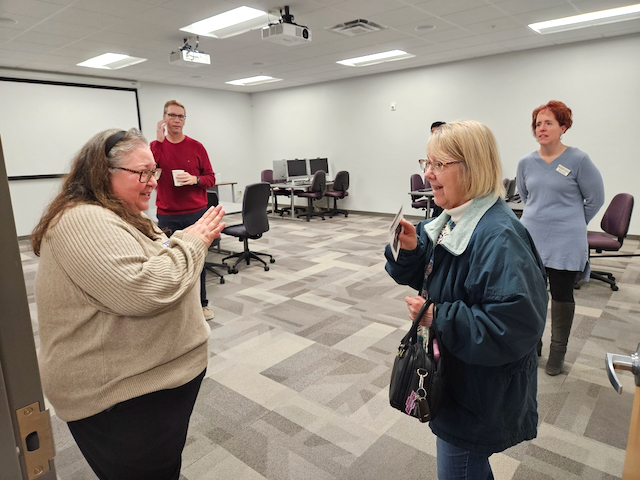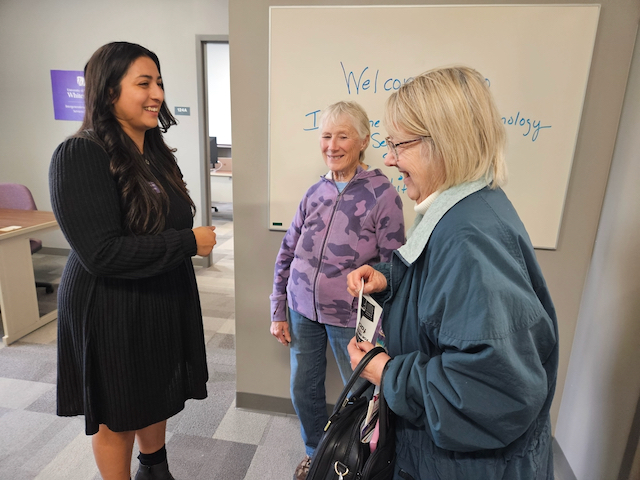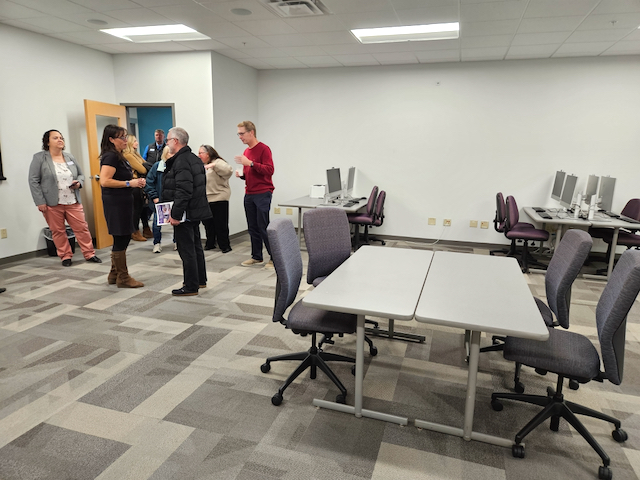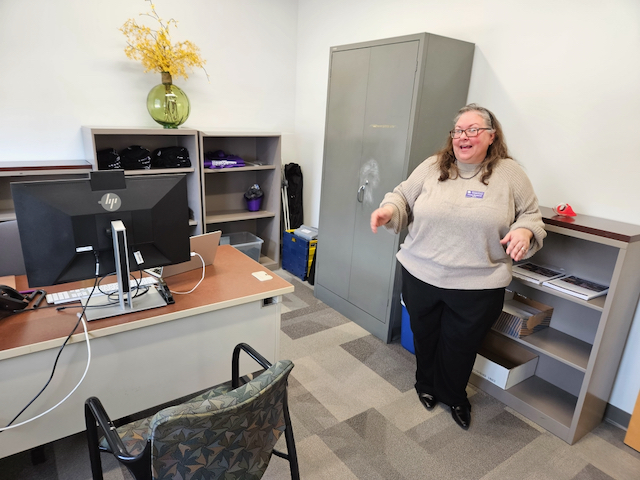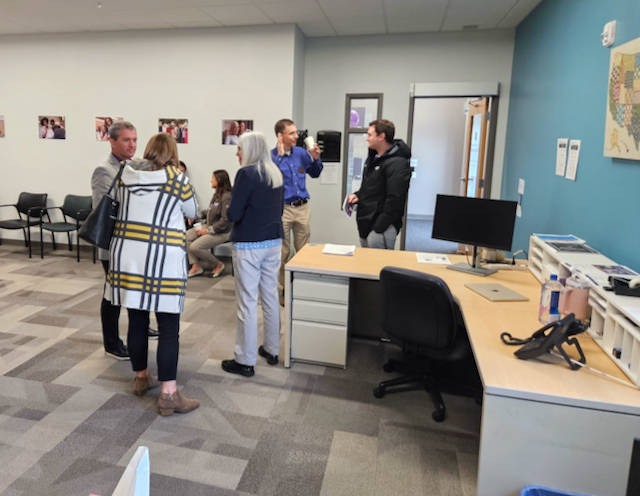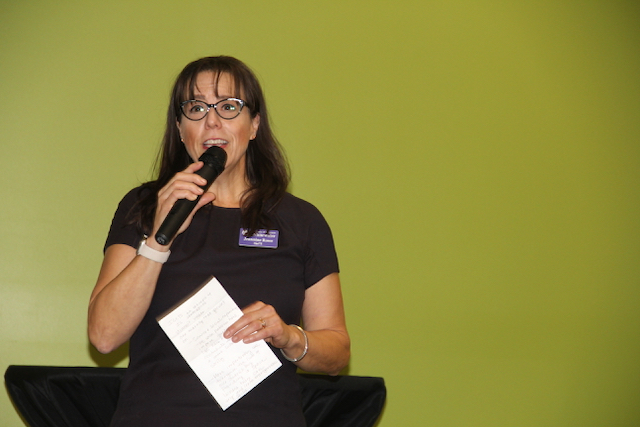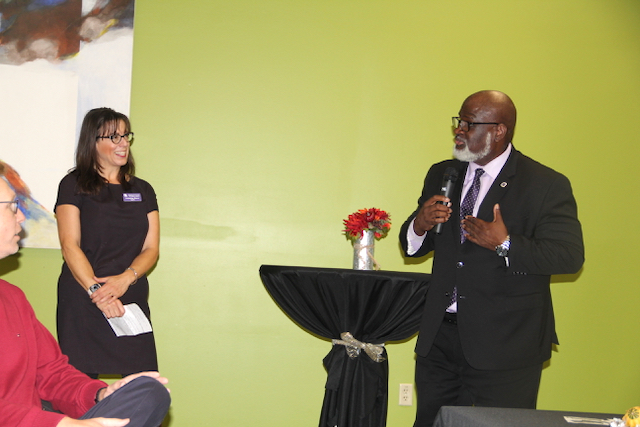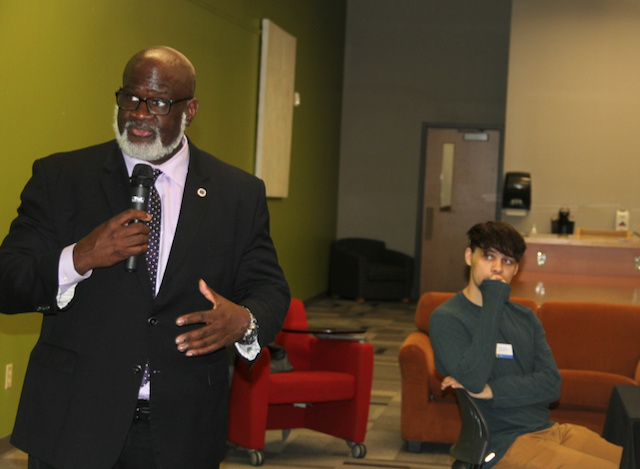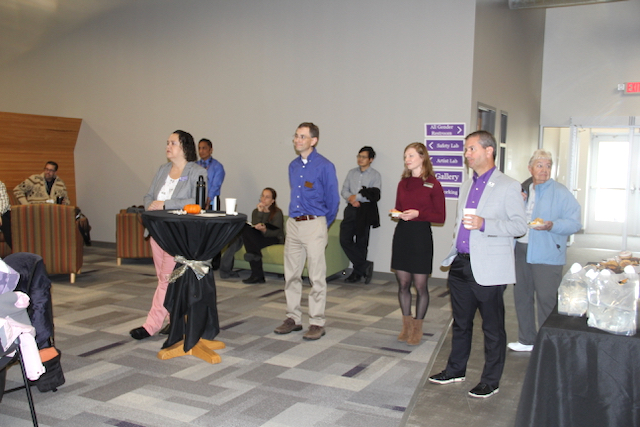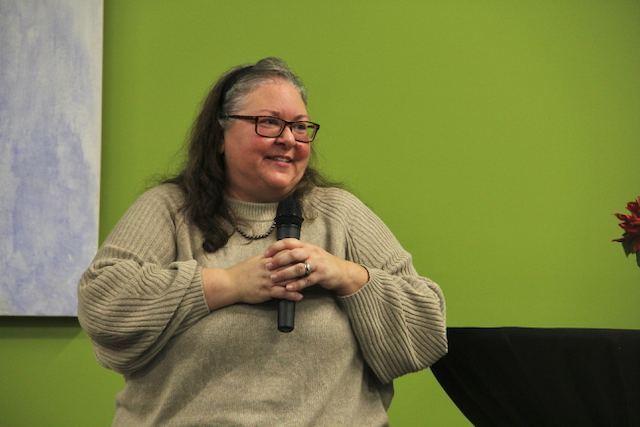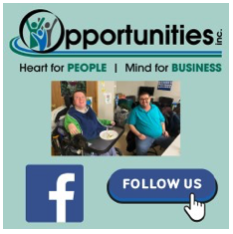By Chris Spangler
Feel like your grandchildren know more about computers and cellphones than you do? Well, it doesn’t have to be that way.
Area adults age 60-plus can receive free technology services through a new program at the University of Wisconsin-Whitewater.
Intergenerational Technology Services (IGeTS) recently held a grand opening at its new home in Room 124 of UW-Whitewater’s Community Engagement Center, where college students are providing free assistance with using cell phones, computers, social media and other technological devices and services to residents of Walworth, Jefferson, Rock and Waukesha counties.
The Wisconsin Department of Health Services awarded UW-Whitewater a $378,400 grant for the program, which is being offered in both English and Spanish. Services include group technology training classes, one-on-one technology assistance and telehealth visit support. The grant is part of a total $12.75 million given to 91 organizations statewide that was made possible by the American Rescue Plan Act.
The center is staffed by Tanya Mordecai, IGeTS director; graduate student Nicole Romero, IGeTS associate; university students and community volunteers. In addition to area residents 60 and over, it also serves persons 18 and over enrolled in IRIS, Family Care, Family Care Partnership or PACE.
The grand opening, held Wednesday, featured remarks by Mordecai, Jeannine Rowe, a social work and gerontology professor and IGeTS ambassador, and UW-Whitewater Chancellor Corey A. King.
“What’s happening here speaks directly to the Wisconsin Idea,” King said, referring to the general principle that education should influence people’s lives beyond the boundaries of the classroom. “The opportunity to engage in the community in this technology space … in advancing and growing our citizens and our members of our communities … is important. And for the university, Jeannine and your team, to be a part of this and for those who supported it is just incredible.
“So thank you for being a part of this; thank you for the vision, the leadership,” he added. “Understanding the intergenerational connection, especially in this technology space, is (wonderful), and so I want to thank all of you for making this happen. Speaking to the vision and mission of our university and this belief in the Wisconsin Idea, we are advancing our community and our region.”
Rowe was among those who spearheaded the intergenerational initiative.
“This space was born out of a need and the recognition that older people and persons with disabilities benefit greatly from technology, and it has a unique opportunity to help people age in place and reside in their own home communities,” she said. “And we also know that young people, folks that we serve here, tend to be the best teachers of technology. We’re really grateful to have that kind of workforce on hand, so this became a unique opportunity to broker the two generations where we could actually meet the needs of the community, which really fits with our values here at UW-Whitewater.”
Rowe said it took a team of people and organizations to make IGeTS a reality. They included the City of Whitewater Seniors In the Park, Fairhaven Senior Services, Greater Wisconsin Agency on Aging Resources and Aging & Disability Resource Centers, among others.
“And we’re grateful to provide students with a unique opportunity for a place where they actually grow their skills,” she said.
Mordecai also thanked attendees for their support and gave a brief synopsis of services.
“We are a free technology service provider to older individuals. We provide one-on-one tech support with their personal devices, we provide group training classes in which we have monthly rotating schedule that’s posted on our website that you can follow, we post weekly tech tips on Facebook for anybody who’s interested … and then we also provide telehealth visit support.”
She explained that the latter is designed for individuals who are working with a specialist or healthcare provider and find it difficult to travel to visit in person. IGeTS has space and computers they may use to attend to their business in private.
Mordecai also announced that IGeTS has broadened its services to adults age 18 and older who are enrolled in home and community-based programs such as IRIS, Family Care, Family Care Partnership or PACE. These typically are people who are living with some kind of a challenge or disability and are enrolled in those programs through Medicaid.
“We also are looking at going out into the community a couple days a week to provide some mobile services to different community partners — libraries, senior centers or assisted-living facilities — just to make sure that we can provide these services to many people in the community” Mordecai said, noting that IGeTS recently taught streaming at one such facility.
During a tour after the program, Mordecai expanded on her remarks.
“We’ve had individuals that are coming in with varying degrees of technology knowledge, which is what makes our one-on-one tech services so optimal for individuals,” she said. “We’ve had individuals who have gotten a new phone and weren’t able to disconnect a phone call — it was like 20 minutes later and all of sudden they heard somebody talking.”
Mordecai said IGeTS also has worked with seniors who have learned how to use the computer keyboard keys but do not know how to, for example, connect to Wifi.
“We’ve had individuals come in and are looking for help connecting with family members, sharing photos through media reels and Facebook, wanting to sell something on Marketplace and how to do Zoom and Facetime,” she added. “So it’s really run the gamut, and we’re branching out in more cybersecurity (subjects) for classes.”
November’s classes, in both English and Spanish, include those on the basics of using Apple and android devices, cybersecurity and using Ancestry.com. The schedule is available at https://www.uww.edu/igets#technology-training-classes.
“Technology can be intimidating, so our goal is to be able to meet people where their needs are. We want them to feel empowered and we want them to celebrate their learning and be able to maintain independence, and to support themselves through health community interaction and engagement,” Mordecai said.
“One of my favorite things is to watch this service delivered to somebody who might feel a little intimidated, but who leaves with a huge smile on their face, realizing they have learned something and they can go home and implement it,” she noted. “While they have a big smile on their face, so do the students offering the services. So you really get an opportunity to see that intergenerational connection and sharing of information to ensure that everyone in the community is able to meet their needs.”
The Community Engagement Center is located at 1260 W. Main St. in Whitewater near Walmart. Room 124 is located in the rear of the building, with free parking nearby.
Hours are 8:30 a.m. to 1:30 p.m., Mondays through Thursdays. IGeTS is closed on federal and state holidays, and Dec. 22 through Jan. 2, 2024.
For more information about IGeTS, visit the program’s website: www.uww.edu/igets, call: 262-472-1837 or email: igets@uww.edu.
